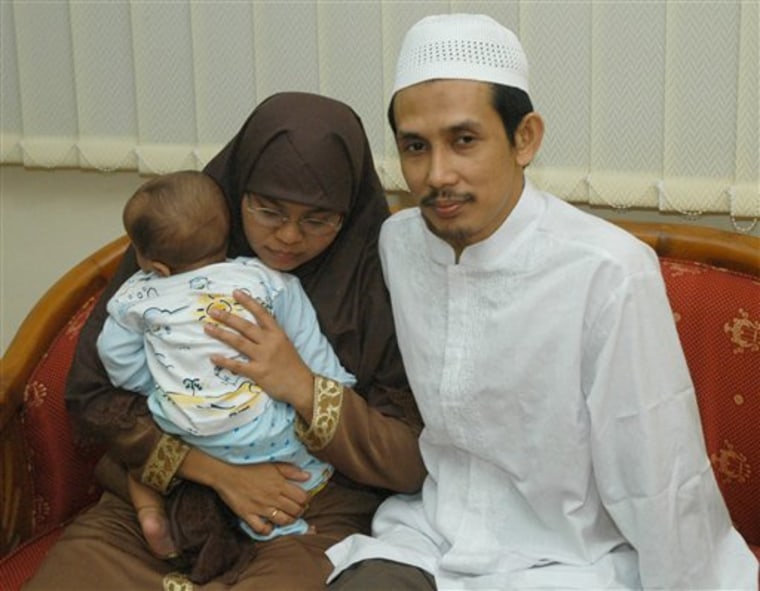The tracking of cell phone transmissions by Australian police via U.S. satellites was central to the arrests of two key Indonesian terror suspects, underscoring the role Western nations play in battling extremism in the world's most populous Muslim nation.
Vital details are only now emerging about this month's arrests, which struck a major blow against a Southeast Asian militant network blamed for deadly suicide bombings.
Indonesian police seized Zarkasih, identified by police as the head of Jemaah Islamiyah, and Abu Dujana, the group's military commander, on June 9. Six other alleged Jemaah Islamiyah members also were picked up.
Also key to the capture of the Afghan-trained pair was information from suspects arrested earlier in a raid on a militant stronghold, and a web of paid informants and former militants working to persuade hard-liners to change sides, according to police officers and Gen. Ansyaad Mbai, a top anti-terror official.
Jemaah Islamiyah members and associates have been blamed for deadly bombings on the resort island of Bali and attacks on the J.W. Marriott Hotel and the Australian Embassy in Jakarta. The bombings _ some of which police say were carried out with funds and direction from al-Qaida — together killed more than 240 people, mostly Western tourists.
Despite a crackdown that has resulted in hundreds of arrests, police and former militants say the threat of another terror strike remains high because the most dangerous extremists have long stopped operating under Jemaah Islamiyah's command.
"The more people who have learned the skills of jihad, the harder things are to control," said Abu Rusdan, a militant cleric who authorities say was a Jemaah Islamiyah leader in 2003. "They feel obliged to carry out actions wherever they are, whether it be Malaysia, Singapore or Indonesia."
Indonesia suspicious of other governments
Details of foreign assistance in Indonesian police work are not normally made public for fear that doing so could trigger a backlash in the country, where suspicion of the governments of the U.S. and Australia runs high.
Mbai, the top anti-terror official at the Coordinating Ministry for Security and Political Affairs, said Australian Federal Police officials based in Indonesia traced terrorists through cell phones and e-mails. Their work was "the key" to finding Dujana, Mbai told The Associated Press on Monday.
"The AFP are in charge of the hardware and the operational side of things, whereas the overall system, the satellites, are American," he said. "I salute their work, they are very diligent. They sit in front of the computer, tracing (suspicious) numbers," he said. "They map them all, and follow the patterns."
Australian Foreign Minister Alexander Downer declined to give details of the role played by Australian Federal Police, telling reporters only that it was well-known that the officers work closely with their Indonesian counterparts.
The United States has helped fund and train an anti-terror detachment of the national police that has been instrumental in finding militants. Some Muslim groups, however, have called for it to be disbanded.
Police have yet to formally charge Dujana or Zarkasih with any crime, but said the former was believed to be involved in the Marriott attack that killed 12 people. In interviews since his arrest, Dujana has acknowledged being military commander of Jemaah Islamiyah, but said he had nothing to do with the hotel bombing in 2003.
Split over attacking civilians
Former militants and analysts say Jemaah Islamiyah has long been split over attacks on civilian targets. Most say the mainstream leaders do not agree with the tactic.
Authorities are working to exploit these difference by recruiting ex-members of Jemaah Islamiyah to visit prisons and meet militants, help identify captured suspects and persuade them to cooperate with investigators.
The most prominent among these is Nasir Abbas, a Malaysian member of Jemaah Islamiyah who was arrested in 2002 and who taught at militant camps in Afghanistan and the southern Philippines. He appeared alongside senior detectives when they announced the arrests of Dujana and Zarkasih.
An AP reporter recently joined Abbas on a trip to a Jakarta jail to meet former comrades serving long terms for the Bali attacks and those awaiting trial on charges of beheading Christians in Indonesia.
After performing the noon prayer with them and handing out packets of rice and spicy fried chicken, he debated the religious justification for the violence. Despite his association with police, he says most militants will meet him and some have changed their views.
"I'm not worried whatever people call me, whether it be a traitor, an infidel or a hypocrite," he said. "It is my duty to tell others to perform good acts and avoid bad ones. People change, everyone is learning and thinking."
